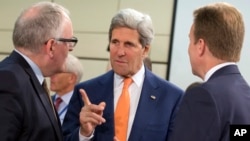U.S. Secretary of State John Kerry is reiterating U.S. calls for Iraqis to quickly form an inclusive government and avoid a power vacuum that could worsen the security situation as Sunni militants sweep across the country.
Coming out of Wednesday's talks with NATO foreign ministers, Secretary of State John Kerry emphasized the need for the alliance to recognize and deal with the evolving threat of extremism -- whether it be in Crimea or Iraq -- where he said the Sunni militant group ISIL's "hybrid" efforts required a re-thinking of strategy and intelligence gathering.
"How do you have not just permanent basing in certain places, but permanent vigilance and permanent capacity to be ahead of the curve. That's what readiness really means," he said.
Inclusive government
In combating ISIL, Kerry said, readiness meant Iraqi leaders must work quickly to create a new inclusive government that would present a unified front to the militancy.
It's a message the U.S. secretary honed while meeting with Shi'ite, Sunni and Kurdish officials this week in Iraq.
"We have an interest in a government that can unite Iraqis that, like Grand Ayatollah Sistani said, will not repeat mistakes of the past and go backwards, but that can actually bring people together. It is up to Iraqis to decide who has the ability to do that and who represents that future," he said.
American officials have refused to weigh in on whether that future involves Prime Minister Nouri al-Maliki, a Shi'ite, who is accused of marginalizing Iraq's Sunni and Kurdish population.
During a speech Wednesday, Maliki dismissed calls for an interim "national salvation government," but did call for Iraqi unity and the completion of the electoral process -- remarks Kerry said were encouraging. Iraq held parliamentary elections at the end of April, but has failed to form a new government.
Colin Kahl, a senior fellow with the Center for New American Security, said Maliki struck a more conciliatory tone in his speech.
Sectarian splits
Kahl noted that U.S. leverage did not just rest with the current prime minister but with the Iraqi political system as a whole. He said Iraq's political elites were recognizing the importance of looking past sectarian and ethnic lines.
"It has to be a national unity government that includes both Sunnis and Shi'ites and Arabs and Kurds and also has real power-sharing and real reforms that dial back the kind of authoritarian powers that Maliki has accrued to the office of prime minister. If Maliki can't agree to form such a government, they will pick another candidate," he said.
Analysts say unless Iraqi leaders work fast, not only will the gains made by ISIL be irreversible, but the country could plunge into another sectarian civil war and further destabilize the region.
Secretary Kerry said Wednesday he would travel to Saudi Arabia Friday to discuss the Iraqi crisis and countering ISIL with King Abdullah. He noted that a "far away threat can have tragic consequences at home in the most unexpected way."




